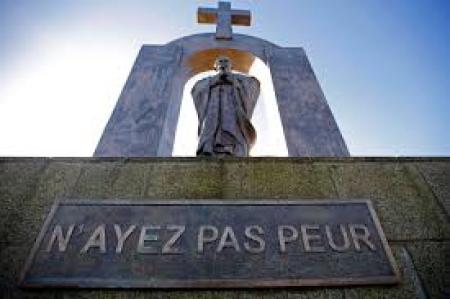French Court Orders Removal of Cross on Pope John Paul II Statue

A cross that's part of a statue of the late Pope John Paul II in the town of Ploërmel, France, will be removed following a controversial decision made by a top administrative court on a decades-long legal battle over the monument's Christian symbolism in a secular space.
French conservatives, alongside Polish politicians, have condemned the decision, with some arguing that secularization goes against European values.
The Telegraph reported on Monday that Ploërmel was gifted the statue in 2006, which depicts the late pontiff in prayer, standing beneath an arch and a large cross, as designed by Russian artist Zourab Tsereteli.
The French court has ruled, however, that the cross must be removed, as it stands in public space and violates the 1905 law that imposed strict separation of Church and State.
The town has six months to remove the cross, though the pope and the arch can remain.
Beata Szydło, prime minister of Poland, where John Paul II was from, has offered to take in the statue in order to "save it from censorship."
"Our great Pole, a great European, is a symbol of a Christian, united Europe," Szydło said.
The prime minister slammed the "dictates of political correctness" and the "secularization of the state," which she accused of promoting "values which are alien to our culture, which leads to terrorizing Europeans in their everyday life."
Valérie Boyer, MP for the Republicans Party in France, asked "when will this madness consisting of trying to erase our roots end?"
Louis Aliot, vice president of the Front National, further added that the "iniquitous" decision could lead to "the destruction of our Judeo-Christian society."
The Local reported that Jean-Louis Bianco, a secularism expert, has called fears that other Christian monuments are going to be targeted "unfounded," saying that Article 28 of the 1905 law provides numerous allowances for religions symbols in public space.
Bianco added that such symbols are permitted on "buildings of worship, burial grounds in cemeteries, funerary monuments, and museums or exhibitions."
Patrick Le Diffon, the mayor of Ploërmel, said that the case could be brought before the European Court of Human Rights.
"The statue is part of the landscape of Ploërmel for 12 years, and it does not disturb the inhabitants," the mayor added, according to Breitbart London.
"On the contrary, it is an undeniable tourist asset for the municipality. The mayor added that "this monument is a work of art and it requires the authorization from the artist to modify it."
Thousands of Polish Catholics, who make up a majority of the country, gathered together along the border earlier in October to pray for protection against the "secularization" and "Islamization" of Europe.
The "Rosary at the Borders" event coincided with the the Feast of Our Lady of the Rosary at the time. Krakow Archbishop Marek Jedraszewski called on believers to pray "for the other European nations to make them understand it is necessary to return to Christian roots so that Europe would remain Europe."





















